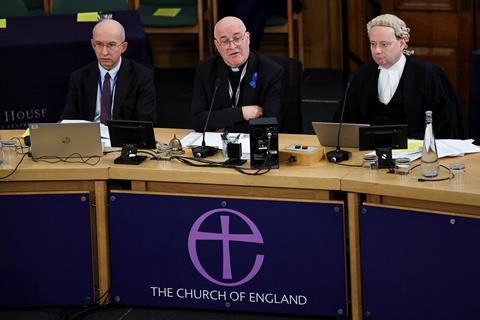To the bewilderment of many, the General Synod has voted against transferring oversight of its safeguarding to an independent body, a decision that George Pitcher says has shown it is well past time to purge the CofE of its hypocrisy

The General Synod is very often called the Church of England’s parliament. But it really isn’t. A parliament has a government and a party or parties of opposition. At synod, there are opposing voices, but they’re all essentially meant to be on the same side.
This may provide an apt explanation as to why — extraordinarily to many minds outside of it — synod has just voted overwhelmingly against oversight for its safeguarding being transferred to a separate, secular regulatory body. Or, more accurately, it has voted by substantial majority for an amendment that diocesan and cathedral safeguarding be retained for the time being until legal options are further explored.
This decision has been variously described as disappointing, capricious, complacent and “a kick in the guts” to survivors of sexual and other abuses by the Church, fresh instances of which seem to come around as regularly as the Church’s liturgical seasons.
It’s a challenge for those of us outside synod to begin to understand how its members think this makes them look. They may not think so, but optics are important. After the monstrous revelations of the abuse from John Smyth and David Tudor, to name just two, the former of which forced the resignation of Most Rev Justin Welby, the first effective firing of an Archbishop of Canterbury in modern history, those who lead the Church of England believe it’s perfectly OK for them to continue marking their own homework.
Safeguarding must be conducted by professionals, not just bishops who consider themselves worthy of having another go at it
To say this isn’t good enough is a bit like saying that President Donald Trump could do a bit better than pardoning himself of all his previous felonies and misdemeanours. Even after all the CofE has been through, its whole revolting litany of crimes and cover-ups – we’re looking at you, Stephen Cottrell, Archbishop of York – it continues to believe that it remains its own best judge and still well placed to put its own house in order. Wow, just wow.
For those grievously affected by abuse, but also for those who observe the institution with objective scrutiny, this is a public glimpse of the arrogance that has contributed so significantly to the Church’s crisis.
It must be acknowledged here that there is an alternative view. This is well espoused by the church affairs commentator, Andrew Brown. In summary, which I hope is fair, it’s that bishops, clergy and their laity are not all bad people – very few of them are – and there’s no evidence a secular body would do a better job of safeguarding. To which might be added that the CofE should be made to clean up its own mess, since it’s not an incapable puppy that can’t.
To which I would reply with three points. I accept that there is an “otherness” to the Church of England; it is not like other institutions. But that’s not a get-out-of-jail-free card. Where is our public scrutiny?
This is a public glimpse of the arrogance that has contributed so significantly to the Church’s crisis
We must ask where the CofE’s humility is, where its self-sacrificial nature? To be Christ-like is to stand before Pontius Pilate in silence, facing judgment. In the Nazarene’s case, this was to face completely unjust, trumped-up charges. Is it too much to ask of his Church, facing rather more just charges, that it offers to give up its safeguarding responsibilities in humility?
My second point also relates to that otherness of the Church. We’re not a corporation (though we are a corporate body), so there are differences. But we can learn from other organisations that have cleaned up their act. The Labour Party, now Government, has moved swiftly to suspend its members who have been part of a disgustingly abusive WhatsApp group. Similarly, the BBC now suspends its employees at a whiff of abusive conduct.
Sometimes, it’s true, such bodies move just too swiftly. BBC DJs Tony Blackburn and Paul Gambuccini spring to mind. The Church itself indulged in knee-jerk defensive action, when it implicated the long-dead Bishop George Bell on untested evidence. But that’s exactly why safeguarding must be conducted by transparent, accountable and professional resources, not just bishops who consider themselves worthy of having another go at it.
Finally, events at Synod point to the Church of England’s urgent need of reformation. We’ve never really had one. We grew out of the Tudor schism with the Church of Rome, not the European Reformation. Consequently, we’ve nurtured our own Pharisaic hypocrisies of the Temple over the past four or five hundred years.
Our synod has just shown it is well past time to purge them.






































No comments yet